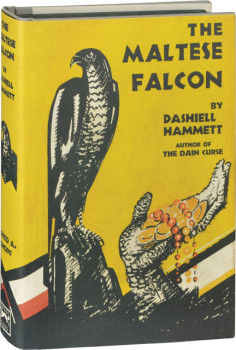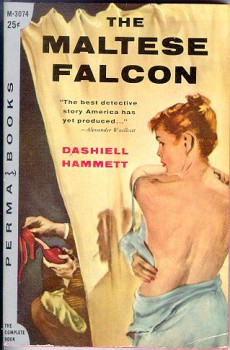Sam Spade and the Pursuit of Empty Dreams
NOTE: The following article was first published on February 21, 2010. Thank you to John O’Neill for agreeing to reprint these early articles, so they are archived at Black Gate which has been my home for over 5 years and 250 articles now. Thank you to Deuce Richardson without whom I never would have found my way. Minor editorial changes have been made in some cases to the original text.

 Much of what has been written about Dashiell Hammett’s The Maltese Falcon focuses on the novel as groundbreaking in its realistic portrayal of detective work. More in-depth literary studies tend to focus on the significance of Hammett’s shift in protagonist from the incorruptible and nameless Continental Op of his earlier work to the jaded self-portrait of the author as Sam Spade. In my view, this transition is primarily noteworthy in that Hammett’s protagonist changed from an idealized conception of the man he might have become had he remained a Pinkerton Operative (the Continental Op is based on Hammett’s boss during his stint with the Pinkerton Agency) to a more self-reflective portrayal of a man mired in moral conflict. Hammett’s own moral crisis would color his fiction from this point until he resolved his dilemma and settled into a life alternating his celebrity status with reclusiveness – a life whose one constant was Hammett’s complete lack of creative output for his remaining 27 years.
Much of what has been written about Dashiell Hammett’s The Maltese Falcon focuses on the novel as groundbreaking in its realistic portrayal of detective work. More in-depth literary studies tend to focus on the significance of Hammett’s shift in protagonist from the incorruptible and nameless Continental Op of his earlier work to the jaded self-portrait of the author as Sam Spade. In my view, this transition is primarily noteworthy in that Hammett’s protagonist changed from an idealized conception of the man he might have become had he remained a Pinkerton Operative (the Continental Op is based on Hammett’s boss during his stint with the Pinkerton Agency) to a more self-reflective portrayal of a man mired in moral conflict. Hammett’s own moral crisis would color his fiction from this point until he resolved his dilemma and settled into a life alternating his celebrity status with reclusiveness – a life whose one constant was Hammett’s complete lack of creative output for his remaining 27 years.
Many have speculated why Hammett’s creativity dried up when he and his muse and mistress Lillian Hellman had settled comfortably into something approaching unwedded bliss as the Nick and Nora Charles of the real world. My own opinion has been that once freed of the conflict of whether or not to walk a path of integrity or give in to the encroaching corruption that constantly assailed his world, Hammett had nothing further to draw upon for inspiration. Resolution was tantamount to becoming a spent force and Hammett was finished as a writer. The fact that he realized this dilemma was inescapable lies at the heart of both The Maltese Falcon and The Glass Key in their pursuit of empty dreams incapable of satisfying the characters whose lust is so great they are willing to die for or kill in their futile quests.